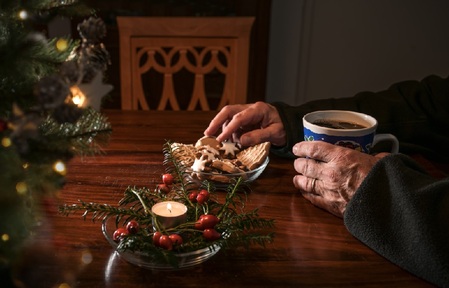Charities warn Omicron variant could worsen older people's mental health this Christmas
Fear, loneliness and the “lack of social contact” among some of the 12.5 million elderly this Christmas could damage their emotional and physical health as the Omicron variant sweeps across the UK, charities warn.

Independent Age and the Mental Health Foundation say as many as 318,000 people in England and Wales aged over 65 lost their partners between the first lockdown and the ‘unlocking’ of May 2021 and with Christmas just days away, for some, this will be a "lonely time" and could "increase feelings of isolation."
'They continue to face the same illness, worsening mobility, grief, loneliness or isolation'
One man in his 70s said the “worst thing has been the loneliness. I can spend (so much time) not talking to anybody, 15 or more hours a day, not talking to a single soul.”
A woman in her late 80s said: “To be in this flat entirely on your own, I mean, I don’t know what I’d do without my little iPad. That is a big part of my life.”
Independent Age is warning many older people’s "mental health needs were invisible" before the pandemic, now, the charity worries the pandemic has "exacerbated" this problem.
Deborah Alsina, chief executive said: "For some older people, the end of lockdown restrictions in the summer did not make much difference: there was no happy ‘return to normal’ for them.
"They continue to face the same illness, worsening mobility, grief, loneliness or isolation – often in combination - as they did before and during the pandemic.
“The government and NHS must not overlook how the pandemic has affected older people’s mental health or the barriers that prevent many of them from getting the help they need.”
'Christmas can be a very lonely time and increase feelings of isolation'
Research from Age UK shows 1.4m older people are expecting to feel lonely this Christmas, and some are feeling depressed and anxious about the prospect of spending it alone.
The charity’s survey shows nearly a million older people don’t have anyone to celebrate the festive period with this year and when it comes to spending Christmas alone this year, around 675,000 over-65s are feeling fed up about this, around 625,000 are feeling depressed, around 400,000 feel forgotten and around 250,000 feel anxious.
Mark Rowland, chief executive of the Mental Health Foundation, said: “While some older people have found ways of coping, such as drawing on past experiences of adversity, experiencing enhanced support from neighbours, family and friends, and spending time in nature, others have faced serious challenges and suffered as a result.
“Fear, loneliness, bereavement, lack of social contact, the inability to do the things that previously benefited their mental and physical health, loss of face-to-face contact and the death of people close to them, have all affected their lives and mental health.
“Similarly, while some have enjoyed the virtual connection conferred by digital technology, others have not, disliking it as a means of contact, or lacking the skills and/or equipment to benefit from it. In addition, Christmas can be a very lonely time for them and increase feelings of isolation.
“Older people should be involved in identifying what will help their recovery and have a choice in how it occurs. Connection and relationships are crucial to this and must be valued and enabled in creative and flexible ways.”
The report called The Mental Health Experiences of Older People During the Pandemic, published today by the two charities built up evidence of older people’s experiences of the pandemic by combining data from the Mental Health Foundation from March 2020 and with information from in-depth interviews carried out between April and June 2021 with 14 people aged between their 60s and their 90s.
Its findings include more than two million people over 65 are thought to be digitally excluded, meaning they can’t use the internet because they can’t afford it, or live in a place with poor connectivity or lack the necessary skills and/or confidence.
Older people’s awareness and use of NHS counselling is low, but research suggests that they benefit from it more than any other age group.
The two charities are calling on the government for more support for older adults’ mental health, as the pandemic continues. The support includes the government and NHS to develop innovative actions to help more people in later life access this vital service, supermarkets, hairdressers, faith centres and other places to help promote bereavement support and national governments, authorities and care home providers to help older adults by offering digital skills and confidence training. This would help to counter some people’s loneliness, which undermines their mental and physical health.
Latest News
 29-Jul-24
Dementia Bus gives carehome.co.uk staff insight into life with dementia
29-Jul-24
Dementia Bus gives carehome.co.uk staff insight into life with dementia
 27-Jul-23
UK's top home care agencies in 2023 revealed
27-Jul-23
UK's top home care agencies in 2023 revealed
 30-Nov-22
A quarter of older people keep their falls secret from family
30-Nov-22
A quarter of older people keep their falls secret from family
 29-Nov-22
'Covid-19 has not gone away' say terminally ill
29-Nov-22
'Covid-19 has not gone away' say terminally ill
 28-Nov-22
IT consultant who received poor care opens 'compassionate' home care business
28-Nov-22
IT consultant who received poor care opens 'compassionate' home care business